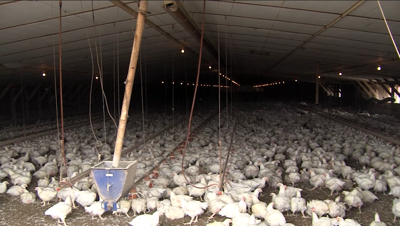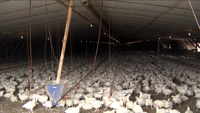EASTERN SHORE, MD - An environmental group is calling on Governor Wes Moore to halt new permits for factory poultry farms in Maryland, claiming the waste produced by the Eastern Shore’s robust poultry industry threatens the health of the public and the Chesapeake Bay.
The Food & Water Watch (FWW) has released an interactive map based on the USDA 2022 Census of Agriculture which they say shows the concentration of broiler chickens farms across the United States. The map shows Delmarva as a deeply concentrated area for the farms.
The FWW claims that concentration generated 548 million pounds of poultry litter waste in 2022 and that the waste has serious impacts on the Chesapeake Bay. Poultry litter, consisting of chicken manure, bedding, and feed, contains high levels of nitrogen and phosphorus.
Holly Porter, the Executive Director of the Delmarva Chicken Association says, "Poultry litter is a valuable local organic fertilizer that is used on family farms to raise the grain that feeds our chickens."
But, when the litter waste is overused as fertilizer, the FWW says those nutrients can contaminate groundwater that then leads to drinking water sources. "Maryland's land capacity to absorb this waste is nonexistent because it has been decades of land application. It ultimately ends up as runoff, which pollutes our waterways and ends up in the Chesapeake Bay," FWW Southern Region Director Jorge Aguilar adds.
Advocates with the FWW are now proposing a moratorium on permits for new industrial poultry farms in Maryland, as well as permits for the expansion of existing farms. The call comes just as Maryland begins a review, conducted every 5 years, of a water quality permit that chicken farms must adhere to.
“We’re calling on Governor Moore to enact a moratorium on any new permits for these factory farms,” said Aguilar. “Gov. Moore has a chance to finally address the continued degradation of the Chesapeake Bay from the runoff from these poultry factory farms. He needs to fix the woeful inspection and monitoring record of state agencies that have failed to deter factory farm waste from polluting the state’s water and air.”
The Delmarva Chicken Association (DCA), which advocates for the poultry industry here on the Peninsula, tells WBOC the FWW's claims are unfounded.
“We’re making it clear that today’s chicken farmers are already safeguarding the Chesapeake Bay and investing in conservation to keep that progress going,” the Association said in a statement Tuesday. “We’re also pointing out the devastating economic damage a moratorium on chicken farms would do.”
In an interview with WBOC Porter explained, "Our chicken farmers are highly regulated. We have a 'no discharge' permit that they are required to obtain, so that permit is written with the concept that no discharges are leaving the chicken farms. The stormwater management plans are written so that none of those nutrients leave the farms, and that's achieved through swales around the chicken houses and through forebays," Porter explains.
The DCA says research has documented that the industry has cut back on nutrient effects to the Chesapeake Bay watershed, and that progress has been evident for years. The Association cites recent Bay report cards as demonstrating that progress, and point to increased development on Delmarva as contributing to nutrient pollution.
The Association also says chicken growers on the Eastern Shore are already highly regulated and must adhere to strict zero-discharge permits. Farmers have also taken conservation steps to protect water quality, the DCA claims.
Finally, the DCA says a moratorium would have widespread negative economic repercussions on Delmarva, saying the move would bankrupt hundreds of farms and destroy thousands of jobs. Chicken in grocery stores, according to the DCA, would also see a spike in prices and become scarce. "It would shut down our chicken community and the family farms raising the food on our plates. You can't ask for a worse impact," Porter adds.
Food & Water Watch hopes to see a decision on the moratorium from Governor Moore by next summer, 2025.





